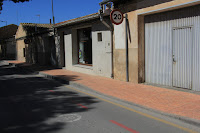 Cabeço towers above Pinoso. It's a salt dome. There are traces of human habitation there in pre-history and people still live on its slopes today. Plonked right on the top are a series of masts which people refer to as the repetidor, the repeater. It's a while since I've been up there but I think there is a mobile phone mast and I know that the local radio station uses one of the masts too.
Cabeço towers above Pinoso. It's a salt dome. There are traces of human habitation there in pre-history and people still live on its slopes today. Plonked right on the top are a series of masts which people refer to as the repetidor, the repeater. It's a while since I've been up there but I think there is a mobile phone mast and I know that the local radio station uses one of the masts too.Apparently it's become a bit of a local tradition to take a night-time stroll up the 893 metre high hill on one of the days during a week dedicated to promoting sport and a healthy lifestyle in Pinoso. Personally it's the first time I'm ever heard of it so the promotion must be spot on but there you go. This year all the walkers were being asked to contribute a euro with the cash going towards research into rare diseases.
We have quite a flash looking sports centre in Pinoso. Well it looks flash to me though I've no significant experience of sports installations to guarantee that my perception is accurate. I did my best to embrace the digital era but I simply didn't have the capacity to take on all those high tech sports clothes too. It's not even a part of the town I go to often.
As I walked a little farther from the town I was surprised to find that there were quite a lot of houses. Where the small scale football stadium ended so did the town houses and the olive trees and almonds took over. The urban street became a single track rural road but there was still street lighting alongside the agricultural water hydrants. An odd mix. I realised it was quiet too. Quiet like it is near our house surrounded by open land. Not much traffic noise but the damned yap, yap yapping of myriad dogs and, just for tonight, occasional shouts and torch beams shining out from a little up the hill where a few spectators were gathering. There were also occasional voices from somewhere nearer the sports centre. The light was a mix of those yellow and orange and pink shades that various forms of street lighting give off. All this within a five minute walk of one of the main thoroughfares in Pinoso. I was wearing a light jacket and a T shirt and I was over-warm. Just in case you're worried I had shoes and trousers and other stuff on too.
 A few people passed me, indeed some people I know vaguely said hello, then the Police car pointed its headlights up the track, turned on the blues and twos and crawled up the road. Behind came 400 people who looked perfectly normal but who had the intention of hiking up a biggish hill on a Thursday evening in the dark. It didn't seem to be a race. I don't know why I'd expected one. I took a few snaps. The people were gone and I walked back to the motor. About a hundred yards from the car park a bloke and a young lad were hurrying up the road. Obviously, despite the start being about fifteen minutes behind time, they'd arrived late. I'm already knackered said the man to the boy.
A few people passed me, indeed some people I know vaguely said hello, then the Police car pointed its headlights up the track, turned on the blues and twos and crawled up the road. Behind came 400 people who looked perfectly normal but who had the intention of hiking up a biggish hill on a Thursday evening in the dark. It didn't seem to be a race. I don't know why I'd expected one. I took a few snaps. The people were gone and I walked back to the motor. About a hundred yards from the car park a bloke and a young lad were hurrying up the road. Obviously, despite the start being about fifteen minutes behind time, they'd arrived late. I'm already knackered said the man to the boy.As I drove away from the town I could see the blue flashing lights crawling up the side of Cabeço. Distinctly odd.







